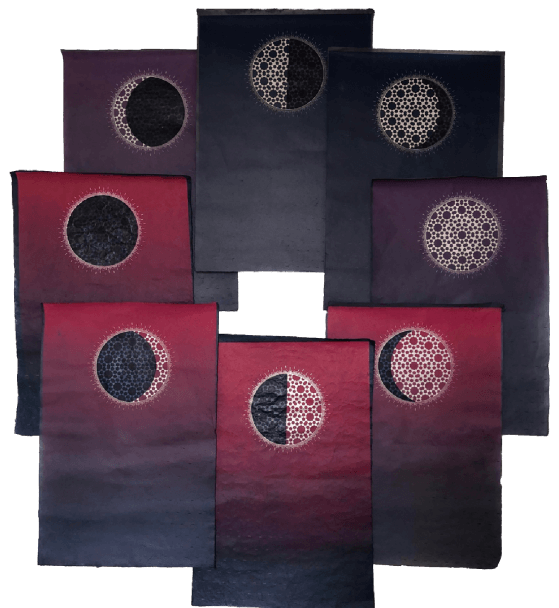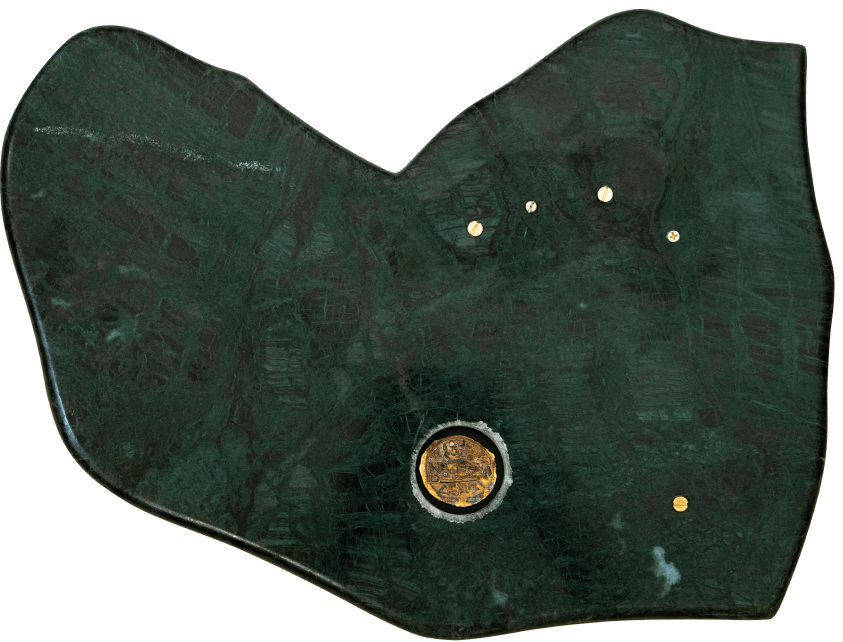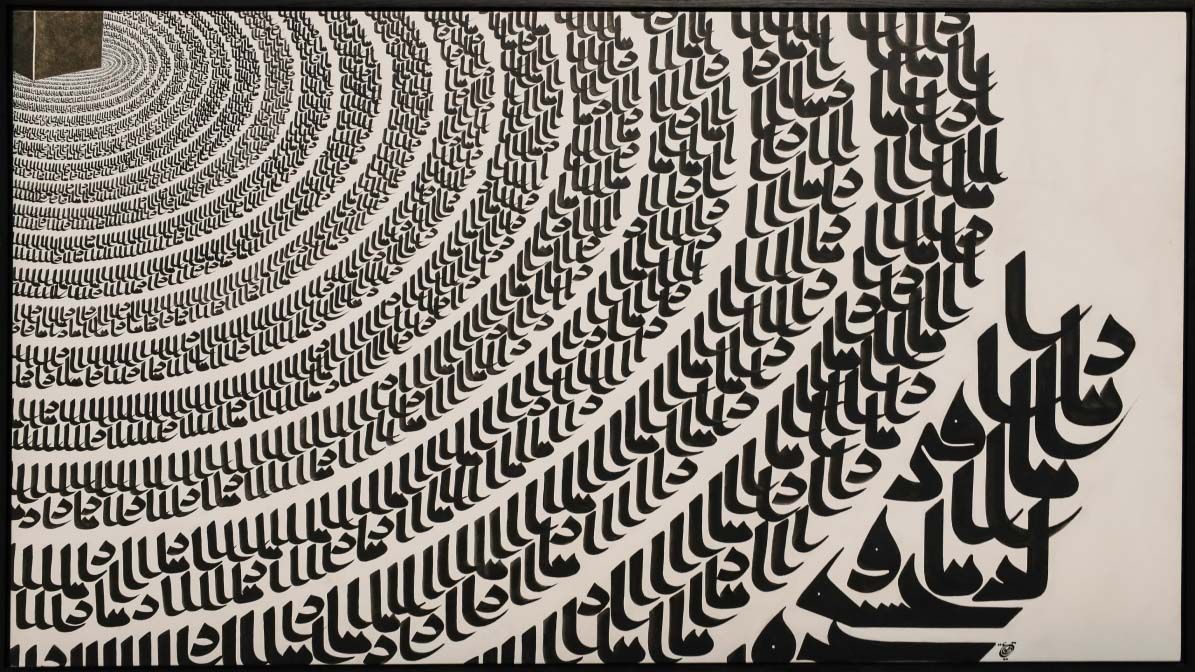Art, numbers and quarantine
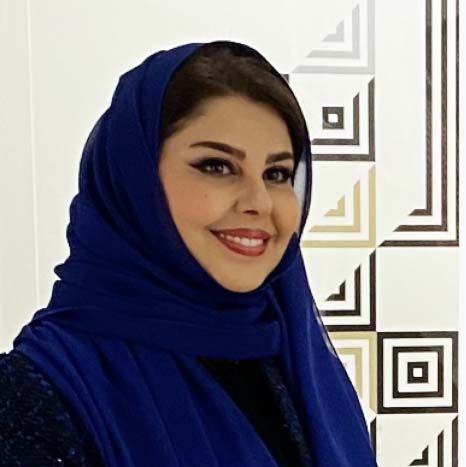
Meet our ‘theme-special’ featured Saudi artist, Lulwah Al-Homoud, a pioneer in contemporary art.
this recent pandemic has brought on many levels, it goes without saying that art and culture have been drastically impacted by COVID-19. One of the biggest challenges facing culture generally, and art specifically, is that it thrives on its response and engagement with the public. But the good news is, under these circumstances, it has become clear that artists remain resilient, and dedicated to creating and recreating. Creatives in all fields have been able to reinvent their art in the toughest of times. I am one of them, and I found inspiration in this difficult time.

Artwork by Lulwah Al-Homoud.
This recent pandemic and the challenges it has brought with it have affected the whole cultural and art industry, especially cultural institutions and art venues
As these art institutes and galleries remain “closed until further notice,” many galleries, museums and auction houses have adapted to the situation by creating virtual tours and selling remotely. When there is a will, there is always a way.
artists are greatly impacted by the current situation, and they are doing what artists do best: creating artworks in response to what is happening. Let us not forget some important artworks that were produced during quarantine throughout history, among them the ‘Self Portrait with the Spanish Flu’ by Norwegian Edvard Munch in 1919, who survived the flu and had painted the iconic piece— “The Scream” —over 25 years earlier. The Mexican legend Frida Kahlo also painted her first portrait when she was forced to stay in bed after the famous accident that damaged her spine and pelvis. It is claimed that because this accident forced her to stay confined, her art career flourished beyond expectation.

“Allahu Akbar,” the piece bought by His Royal Highness Crown Prince Mohammed bin Salman Al Saud.
I believe it is natural and healthy to try to deal with frustrations or fears through a comforting, familiar process. And I found it both creative and amusing to see people post recreations of their favorite art pieces while staying at home.
On a personal level, the current situation made me think of my childhood and how I was obsessed with shapes and numbers, despite the fact that I wasn’t really a good math student – and failed algebra once! At college while studying sociology, I realized that I had to draw simple lines and shapes to understand the theories and I remained an average student, despite the fact that I came from a family of high achievers (both my older sisters were A-grade students). We were raised by a father who was a high achiever in education and a great success in his profession.

Artwork by Lulwah Al-Homoud.
My father passed away when I was a child but his influence remained, and it made me ambitious. Every time I succeed in a project, I feel he is there with me, encouraging me from within. The first time I felt connected to a subject I was studying, was when I was studying visual communication design in London and I completed a bachelor’s degree in it from The American College.
That connection led me to graduate cum laude, with distinction and honors. It was not my aim to be an A student, it just happened because I was thoroughly enjoying what I was studying for the first time in my life. I believe it is important for everyone to find that thing they love, no matter how minor, and for sure they will excel in it.
My connection to numbers came to life when I was researching Islamic Art during my MA at Central Saint Martins in London when I came across the Vedic Square, one of the methods Muslim artists used in early times to create patterns, a 9x9 multiplication table borrowed from Ancient North India. And this inspired me to create the ‘Language of Existence’ series, my ongoing art series. Ironically, math, a subject once difficult, made sense to me through art and spirituality. After finishing my master’s degree, I worked as a designer and a creative director for many years but I was always attracted to art and worked as a curator in London. I became an artist by coincidence when I was curating one of the exhibitions and an expert saw my sketches and told me, “there is something special here," and how I should pursue an art career.
It all began from there! Being an artist was never planned. But in many ways, that is life, can we really plan our lives? At the beginning of this current quarantine, I enjoyed the slow pace. My life as an artist is hectic with exhibitions and events that require a lot of traveling. I wanted to create art but my studio and all I need to produce art, is not with me currently and it is difficult to travel.
While I was organizing my home, I found packs of dice that I bought from London recently without knowing what to do with them. I loved them as objects – especially their special blue color. I started to play with them, and slowly my creativity directed me to turn these simple everyday dice into a philosophical artwork. Since I cannot recall a time in life where numbers have become so relevant, from the cases of COVID-19 infections,
to the number of family members that can be together at one time to even counting the days of quarantine, I created an artwork based on a verse of Abu Al-Atahiyah (748-828), my favorite poet from the early Islamic period for his spirituality and wisdom. The verse is about counting his days and expressing his awareness of his temporary existence in this life.

Artwork by Lulwah Al-Homoud.
Spirituality is definitely a huge blessing during quarantine. I am not bothered by the lengthy pause of life activities, in fact, I am enjoying it and I look at it as an opportunity— an opportunity to meditate, create, and reflect. I leave you with a question: What numbers matter to you? and why?
By asking yourself this question, you may find an answer you never knew you had. I love odd numbers, my favorite is number nine. The number 9’s times table with its results creates a perfect pattern and if we sum up the digits of its results to one digit, we will always get number nine! Miraculous, isn’t it?!
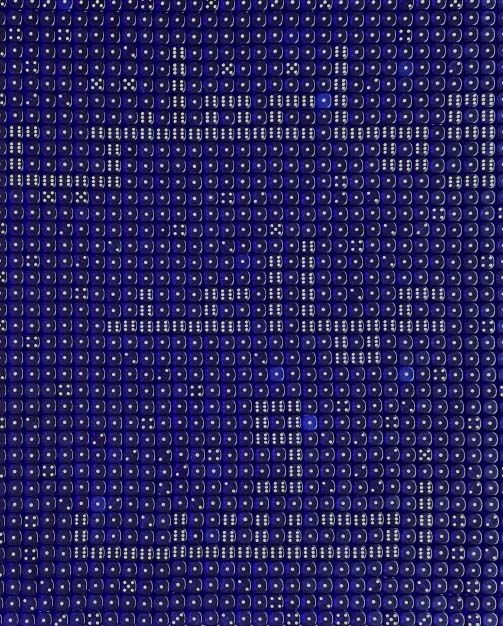
Ithraeyat cover artwork by Lulwah Al-Homoud.

Ithraeyat cover artwork by Lulwah Al-Homoud.
Number of cases of those infected with COVID-19. Curfew from this hour to that hour. The prices of this and that; the number of days things were closed or open; the distance that must be kept as part of social distancing; and the capacity allowed within public places. Numbers and figures dominate our lives in one form or another.
From the reported facts and statistics that impact our mobility today due to the global health crisis to the numbers found in our IDs, our phone numbers, grades at school and at work, our weight and height, our age, and numerous other ways.In this second issue of Ithraeyat, we pay homage to numbers and their place in our lives. Numbers are everywhere, in our architecture, in our cars, in ou food, in our clothes, and even in our bodies. The art on the cover is an exclusive debut piece by award-winning Lulwah Al-Homoud who was influenced by the daily news of numbers and how – in some ways – our lives are impacted by the unpredictable outcome of a roll of dice.
The poem featured is by Abū l-’Atāhiyya ‘Father of Craziness’ (748-825/826), one of the earliest philosophical poets and a prolific poet of ascetics. He was also the first Arab poet of note to break with the conventions established by the pre-Islamic poets of the desert and to adopt a simpler and freer language in poetry.
The lines featured are roughly translated to: “I am counting my days and trying to figure their sum Ignoring not what I am calculating…”
Lulwah Al-Homoud is a pioneer Saudi artist and founder of LAHAF art foundation.
Instagram @lulwah_al_homoud
Twitter @Lulwah_AlHomoud
To read more about the artist and her journey, check here for Lulwah Al-Homoud’s interview with Ithra.
